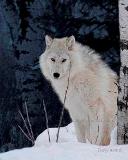Dharma is a perfect example
of how variant personalities can be from one wolf to the next. As easy going as legend is, Dharma takes the world VERY seriously.
Just like people, wolves can get moody, but wolves can
be highly reactive, or even overreact at times, depending on the situation and the surrounding circumstances.
In the wrong inexperienced hands, all of
what makes a wolf a wolf, can be potentially dangerous. It must be pointed out that though dharma is what I consider
*tame* to a certain degree (some other experts may agree or argue this point) she still retains inherent wild tendencies,
regardless of being raised in a captive situation. Wolves are NOT domesticated, no matter how many generations of them have
been raised in captivity,/domestic situations.
I have heard the term *domestic* wolves, but IF this term is used, this
should not be a referral, and taken to mean *domesticated*. There are some lines of wolves that can inherit and pass
on more tractable traits, like Legend and Tibet (these types of wolves are great working in film etc) but even they do not
become *dogs* nor can you make them into one .
Though wolves do not display any known behaviors not also found in the typical domestic dog, what varies is
the frequency, and intensity of the behaviors and in which
context those behaviors may be expressed.
Dharma's
space, needs and wants are respected at all times. Why argue with a wolf? Through many years of studying and analyzing
wolf behavior (ethology), wolf language becomes easily read. They certainly are far from unpredictable. Any
training done with the wolves at AWA is done because it gives them something to do, and it can help give the people
working with the wolf somewhat of an upper hand when it comes to having to take them to the vet, get a lead on them, or prepare
them for getting any blood work done, training helps to give *any canine* guidance even wolves, to a point.
Contrary
to popular belief wolves can be trained to a certain degree, wolves like to work and use their minds, and training helps them
to accomplish this. If one works with the wolf and is attentive to the wolfs needs and desires it is not as
hard as some may think to get the wolf to do what you want them to do. Though training can help shape even alter the nature
of wolves through nurturing, nature certainly plays a big part in what a wolf is truly all about, and in the end this
must be taken into consideration if one wishes to be dealing with such creatures in their daily lives.
Wolves are magnificent to watch and dharma is no exception when it comes to what a wolf is.
One cannot push themselves onto a wolf, it is disrespectful of the wolfs own personal space, just as people need it so do
wolves. When we are feeling icky do we want people to grab us out of the blue regardless of our feelings? Wolves are
tolerant to a degree but as with all animals including the human animal wolves have their snapping points too. They will come
to you on their time and will display affection when they see fit to do so. They do not live their lives to please humans
the way dogs do. Wolves are independent animals and this independence makes them survivors.
Their teeth, their brain size, their legs, their chests, their nails, feet, tail, ears, coat are all
designed to aid the wolf in surviving in the wild. In the classrooms I have taught the kids differences between our domestic
bunny rabbits we have as pets and the wild jack rabbits. Jacks Rabbits (Hares) are *designed* with more exaggerated
features their feet size and leg size for hopping faster and farther distances in one leap, their ear size for hearing predators
better, the same thing can be said about wolves, they are exaggerated souped up canines (liken
this comparison between a 3 cylinder car and a ferrari), and they are souped up for VERY
specific reasons. I am honored to share their world, and never lose sight of the fact that their lessons are
constant.

